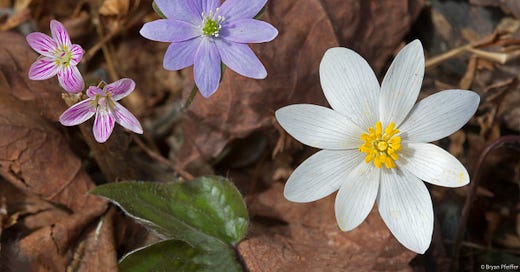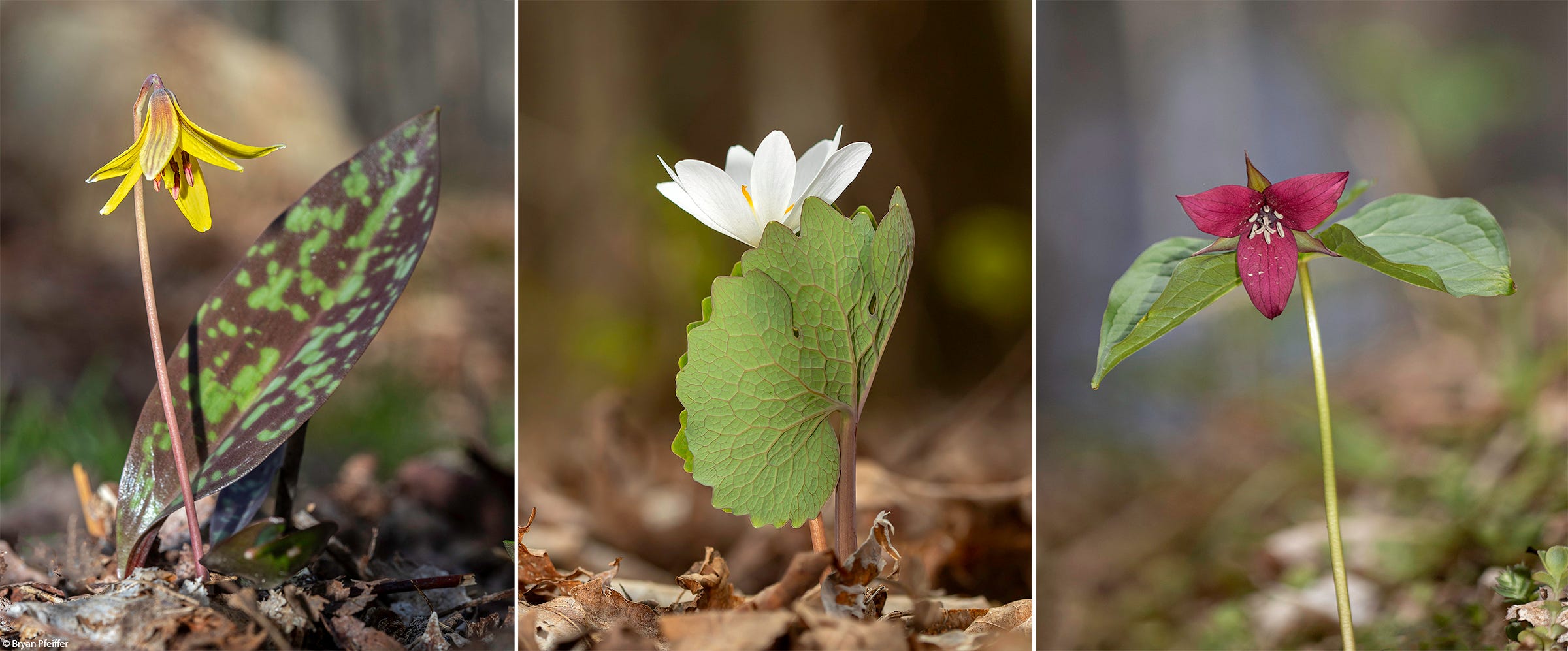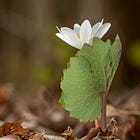IN THE naked woods of April, you will find neither tariffs nor turmoil — only grace and renewal. Spring-beauties emerge to bloom hot pink from last autumn's fallen leaves. The flowers of Hepatica are soft pastels of blue, lilac, or cream. And the Bloodroot: well, the Bloodroot is immune to the blood sport of commerce and politics.
The world economy, we are told, is in upheaval owing to men in power with ideas about money and free markets. Stock prices swing. People profit. People suffer. So much is at stake in the stuff we buy, much of it imported from faraway places we’ll never visit.
Those perfect flowers in the woods near home? They come your way gratis. So does the dawn chorus songbirds. Even the amphibian orgies now underway won’t cost you a cent. Nature’s like that — it offers us so much and asks so little in return. Certainly not tariffs.
Let’s face it: For better and for worse, the human experience has become in large part a matter of commerce. Spending is what so many of us do. Oh, sure, we devote ourselves to art and literature, to charity and community, and to the people we love. All good. But so often we drive around and buy stuff. It’s harmful to the planet — perhaps to us.
Before we celebrate these wildflowers, however, please know that I intend no sanctimony here. To be sure, we purchase essential food, shelter, and clothing. We buy stuff as expressions of culture and identity, and for work and emotional well-being. Still, lots of what we buy doesn’t necessarily make us happier. So much of it is artifice. Plenty of it ends up in basements, storage sheds, or trash cans. (For what it’s worth, I myself continually aim to live ever smaller and happier within an indoor space of 462 square feet and an outdoor space of infinity.)
Regardless, by way of respite from the trade wars and the general maelstrom of news, my goal is to get you to the woods before it’s too late. Because this isn’t merely about tax-free wildflowers. It’s about the profound nature of experience, costing you little more than curiosity and time.
The “Ephemerals”
Forget the aphorism “April showers bring May flowers.” Like everything in nature, the time to be in nature is now (and yesterday). Across much of the northern U.S., southern Canada, and Europe, the woods are erupting in bursts of the most pleasing (even ruthless) blossoms. You can find them if you know where to look. (Below, I’ll help direct Chasing Nature’s paying subscribers to the right spots.)
In a class of their own, “spring ephemeral wildflowers,” as some of them are known, have a strategy that’s probably suitable for all of us: Life is short so don’t waste your time in the sun. For the flowers (not necessarily for us), that means pollination, often with help from bees, flies, and other insects. Basically, these plants complete their business of reproduction before the tree canopy leafs-out overhead to shade the forest floor. Even while patches of snow linger in the woods, these blooms are early bursts of color, form, and function. They’re like rainbows or shooting stars, only much more reliable. I don’t know anyone not charmed by these flowers.
Nor do I know anyone who ever woke up one morning thinking or saying, “You know, I wish I could buy a chocolate-chip pancake wrapped around a sausage on a stick.” Nonetheless, the engineers and marketers at Jimmy Dean Foods (parent company Tyson Foods, Inc.) saw fit to foist this “food product” upon consumers. Similarly, did humans ever ask for electric carving knives, ThighMasters, Pet Rocks, or so-called “smart” products putting us and our coffee makers, window blinds, and beds ever more online (and in the crosshairs of yet even more engineers of marketing)?
The commodity now is us.
And it doesn’t end there. Sadly, consumerism is in some respects feeble by comparison to the latest march of commerce. No, it’s not merely the stuff we buy anymore. Instead, the commodity now is us. More to the point, our minds, which have become frontiers for exploitation and profit. Even as we might have welcomed email, social media, and iPhones many years ago, I suspect none of us at the time said or thought, “You know, I’d really like to spend a good portion of my day online and tethered to a screen, distracted or outraged while scrolling through a landscape of hyperbole, fear, and acrimony.” Even if we’re able to manage a healthy online diet of worthy information, there is simply too much of it coming at us every day.
That’s why I never lose sight of the early spring wildflowers. Or the ethereal song of a Hermit Thrush. Or the fruit-punch flavor of a serviceberry. Or sitting beside a brook so that it can babble at me all day long. The opportunities are endless. Not merely things in nature, these are experiences, manifestations of what it means to be alive and aware in the real world, the wild world, free of tariffs. All we really owe to it instead is to know and revere and fight for nature in whatever ways we can. Especially now.
For any of us, it can begin and end in the woods with a wildflower. Because oddly enough, maybe a wildflower isn’t all that much different from power or money — or even the life you or I aspire to live. Any of it can vanish in a single day.
Flowers For Paying Subscribers
If you live in northern or mountainous U.S. states, southern Canada, or Europe, I might be able to get you to some of these spring ephemeral wildflowers. Find them mostly in open deciduous woods with rich soils (which means calcium from glacial till or limestone or similar bedrock).
If you send me an email (which works only for paying subscribers), I’ll reply with links to a series of maps indicating where some of these plant species have been reported. The good sites tend to be known locations (often because of the flowers); and of course your best bet will forests with public access. No guarantees, but I’ll do my best.
My Profound Relationship with Bloodroot
Podcast Episodes Are Coming
The “Ask Me Anything” episode of the Chasing Nature Podcast is now in the works thanks to probing questions from paying subscribers. My goal is to release that episode before the end of April. Then, in May, I’ll rebroadcast a birdwatching outing I took with Erica Heilman, creator of Rumble Strip, a podcast which has won awards from the likes of Peabody, The New York Times, The Atlantic, and The New Yorker. (Can I be worthy? That’ll be up to you.)









So beautifully written.Happy spring!
So true! All of the stuff in the world is distracting us from who we actually are....children of nature. Deep down what we are actually craving is to feel and know that we are part of this glorious earth. Thank you for the beautiful photos and for putting all of this in perspective.